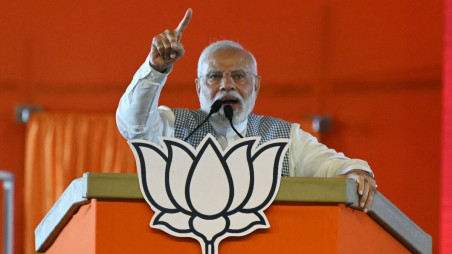What the controversial Ram Temple means for India's Hindus and Muslims
On 22 January, Modi is set to lead a consecration ceremony opening the Ram Mandir to the public.

On a plot of land in Ayodhya, a small city in northern India, Prime Minister Narendra Modi has achieved a long-standing goal that has created divisions between the country's majority Hindu and minority Muslim populations for decades.
The plot is home to the soon-to-be inaugurated Ram Mandir, a sprawling temple complex devoted to the Hindu god-king Ram. Devotees believe the temple site is Ram's birthplace. It was formerly occupied by a 16th century mosque razed in 1992 by Hindu extremists. That act of destruction prompted a wave of deadly Hindu-against-Muslim riots and helped fuel the rise of the so-called Hindu nationalist movement.
1. When is the Ram Mandir opening?
On 22 January, Modi is set to lead a consecration ceremony opening the Ram Mandir to the public. The temple's opening, timed to occur just months before a national election widely expected to hand Modi a third term, fulfills a longstanding campaign promise by his Hindu nationalist Bharatiya Janata Party.
The ceremony marks the opening of only a portion of the temple, with the remaining wings still under construction and set to open sometime in the future. Officials in December announced the completion of a new Ayodhya airport to handle the expected stream of pilgrims to the temple, and the city is experiencing a boom in construction of hotels, roads and other infrastructure to accommodate the inflow.
2. Why is the temple important to Hindus?
A central figure of one of Hinduism's holy epics, the Ramayana, Ram is revered by many Hindus. Many right-wing Hindu activists believe that the mosque that preceded the Ram Mandir, known as the Babri Masjid, was deliberately built on the site of Ram's birth in an affront to Hinduism.
They also believe the site previously housed a Hindu temple.
Discord over the 2.77-acre plot has simmered for years and fueled tensions between India's two largest religious groups.
According to the most recent census, Hindus account for 80% of India's population of 1.4 billion, while Muslims make up about 14%.
3. What's the history of the battle over the Ayodhya site?
During colonial rule, the British kept the site divided. They permitted Muslim worshipers to pray inside the mosque and Hindus to worship outside.
In 1949, two years after India gained independence, Hindu activists broke into the mosque and placed an idol of Ram inside.
Anticipating violence, the Indian government locked the main gate and eventually closed the mosque permanently — until 1986, when the gates were re-opened, many argue with the consent of the government, then led by the Indian National Congress party.
In the 1980s, Hindu nationalists launched a campaign to build a temple to Ram there.
On Dec. 6, 1992, a group of Hindu activists gathered and, in the presence of authorities, demolished much of the Babri Masjid. The mosque's destruction led to nationwide riots in which thousands, mainly Muslims, died.
4. How was the legal battle resolved?
In 2010, a court in the nearby city of Allahabad awarded Hindu petitioners a portion of the site of the former mosque and the right to build a temple there.
The court even took a view on the question of Ram's birthplace, affirming that the deity was indeed born at the disputed site.
The case was appealed to India's Supreme Court, which in 2019 ordered the entire site handed over to a trust that would build the temple.
Construction of the Ram Mandir began in 2020 with a groundbreaking ceremony led by Modi. The court separately awarded a five-acre parcel of land elsewhere in Ayodhya to a local group of Muslims to build a replacement for the Babri Masjid.

5. How is Modi linked to the Ram Mandir?
The dispute over the Ram Mandir site became a central issue to the BJP and its Hindu nationalist movement.
Modi was among the organizers of the campaign starting in the 1980s to build the temple.
The BJP has included a call for building the temple in every election manifesto since 1996, and Modi has used the issue to whip up support within the Hindu nationalist movement.
In 2002, when Modi was chief minister of Gujarat state, a wave of anti-Muslim riots erupted there stemming from the deaths of pilgrims returning from Ayodhya.
Critics say he didn't do enough to halt the violence, and in 2005 the US denied Modi a visa over his alleged failure to control the riots under rules that ban officials responsible for "severe violations of religious freedom."
Modi has denied not doing enough, and a panel appointed by India's Supreme Court in 2012 found no evidence his decisions prevented victims from receiving help. The US visa denial was lifted when Modi became India's prime minister in 2014.
6. How has the BJP promoted Hindu nationalism?
While India was founded as a secular state that favored no religious or ethnic group, the BJP has, in its decade in power, pursued a number of policies aimed at reshaping India into a more overtly Hindu society.
These include the passage of a citizenship law that prioritizes citizenship for non-Muslims, the stripping of autonomy for the Muslim-majority state of Jammu and Kashmir, and state laws that put up barriers to marriages between Muslims and Hindus.
Critics say the elevation of India's Hindu majority has led to persecution and violence against minority groups, and come at the expense of addressing persistent problems such as government corruption, unemployment, poor education standards and rising income inequality.



 Keep updated, follow The Business Standard's Google news channel
Keep updated, follow The Business Standard's Google news channel


















